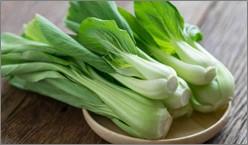

Bok choy is a type of Chinese cabbage, is a high nutrient dense cabbage that can promote health, prevent chronic disease, help build strong bones, and improve blood circulation. Originated in China but can be found in many areas around the world, especially Europe. Bok Choy can be found at many larger grocery stores.
Bok Choy is rich in vitamins and minerals including vitamin A, E, K and B6, potassium, phosphorus, copper, manganese, and selenium. Powerful antioxidants and flavonoids like lutein, beta-carotene, vitamin C and quercetin can fight off free radicals and reduce inflammation in the body to prevent chronic disease. Eating Bok choy may help lower your risk of developing cancer.
Bok Choy can improve bone structure and density as it contains critical minerals such as calcium, zinc, iron, and magnesium that can help preventing osteoporosis as we age. This dense vegetable is a good source of vitamin K and can lower the risk of bone fractures in older age and is a blood clotting agent necessary for wound healing. Bok choy contains iron which is necessary for red blood cell formation and circulation.
According to the CDC, heart disease is the leading cause of death in the United States. Eating a diet rich in fruits and vegetables may help lower the risk of developing heart disease. Bok choy can be a great addition to promote heart health as it contains folate and vitamin B6 which help remove a compound called homocysteine from your blood. Excess homocysteine can be damaging to blood vessels and increase the risk of cardiovascular disease.
During pregnancy, folate intake needs to double as insufficient folate can lead to birth defects like spina bifida and anencephaly. Bok choy can be incorporated into the diet to help increase dietary folate intake for women who want to become pregnant and who are pregnant.
Though this versatile cabbage has many health benefits, there is something to watch out for when consuming boy choy. Due to its high vitamin K, this acts as a blood clotting agent. For those who are using blood thinners, such as warfarin, should consult their doctor before adding this cruciferous vegetable to their diet.
When choosing bok choy, find a bundle that is firm, compact and fresh. There should be no brown spots and avoid slightly wilted leaves. Larger leaved bundles are great for soups while smaller ones with narrow stems are better for stir frying. Store bok choy in a perforated plastic bag in the refrigerator for 2-3 days. This Chinese cabbage does wilt faster than a regular head of cabbage so they will need to be used sooner after purchasing them.
Versatile and delicious, bok choy can be used in many dishes and is a popular ingredient in Asian cuisine. There are many ways to use this leafy vegetable including shredded for salads, steamed, chopped, added to stir fry, grilled, and used in soups. Prepare the cabbage cutting it lengthwise or into quarters then wash thoroughly to remove any dirt. Trim any wilted or blemished leaves. Bok choy cooks quickly within 5-10 minutes depending on the recipe. When cooked correctly, it will have a light refreshing taste, but if overcooked it will become mushy and dull. Experiment and enjoy the amazing health benefits of this tasty cabbage.
Sources:
https://www.organicfacts.net/health-benefits/vegetable/bok-choy.html